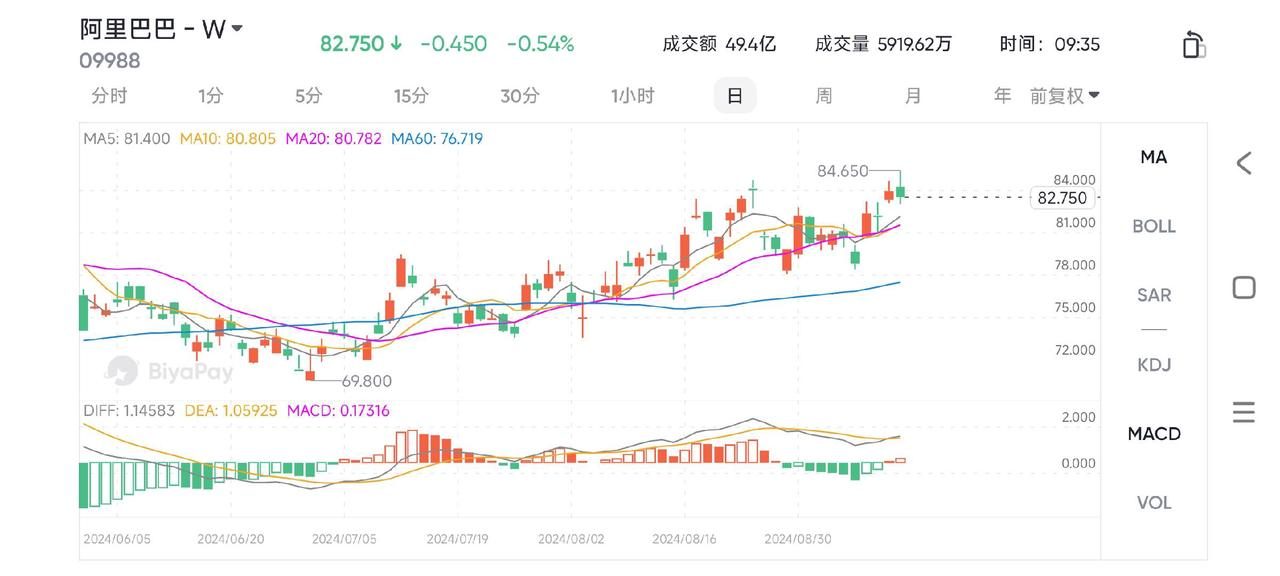- Remittance
- Exchange Rate
- Stock
- Events
- EasyCard
- More
- Download
- Creator

Alibaba's Inclusion in the Hong Kong Stock Connect Leads to a 4.21% Surge in Stock Price on the Firs
On September 9, 2024, the relevant exchange announced that starting from September 10, 2024, Alibaba Group Holding Limited (stock code: 09988.HK) was officially included in the Hong Kong Stock Connect. According to market data, on the first day of inclusion, Alibaba’s stock price rose by 4.21%, and the transaction volume reached 17 billion Hong Kong dollars, which is about three times its average daily transaction volume for the year, accounting for more than 15% of the total transaction volume of the Hong Kong stock market.
Alibaba’s inclusion is seen as a significant strengthening of the foundation for value investment in the Hong Kong stock market. This change is not only beneficial to Alibaba itself but may also attract more mainland capital to flow into the Hong Kong stock market, enhancing the overall market vitality and attractiveness.

Alibaba’s inclusion may also alter investors’ investment strategies for various technology stocks, especially in the current volatile economic situation. Investors may shift their focus to companies with strong fundamentals, and Alibaba is undoubtedly a leader in this field.
Key Driving Forces Behind Alibaba’s Inclusion in the Hong Kong Stock Connect
In the global business environment, Alibaba Group Holding Limited has become a globally important enterprise with its leading position in e-commerce and technology. It has shown strong growth momentum in multiple business areas, including retail, internet services, and artificial intelligence technology.
On September 10, 2024, Alibaba was officially included in the Hong Kong Stock Connect, marking an important milestone in the company’s capital market development.
Previously, Alibaba had achieved a dual primary listing in Hong Kong, meaning its stocks are listed on both the Hong Kong and New York stock exchanges, providing a broader range of investment opportunities for global investors.
Analysis points out that a dual primary listing means that even if the company is delisted from the US stock market, its Hong Kong stocks can still be traded; however, a secondary listing is different, meaning that once the company is delisted in the United States, its listing status in Hong Kong will be uncertain. This means that Alibaba’s completion of a dual primary listing has removed obstacles for entering the Hong Kong Stock Connect.
On the first trading day of being included in the Hong Kong Stock Connect, Alibaba’s stock price performed well, increasing by 4.21%, with a significant increase in transaction volume, reaching 17 billion Hong Kong dollars, which is three times its average daily transaction volume for the year, accounting for more than 15% of the total transaction volume of the Hong Kong stock market. This significant increase in transaction volume reflects the market’s positive response to Alibaba’s inclusion in the Hong Kong Stock Connect and indicates that more capital inflows may be expected in the future.
Market analysts and financial institutions have conducted in-depth analysis of the impact of Alibaba’s inclusion in the Hong Kong Stock Connect:
Cui Shifeng, the chief analyst at CITIC Construction Investment Securities, believes that this list adjustment has introduced some large-cap stocks, especially the addition of Alibaba, which is of great significance to the entire Hong Kong stock market.
He pointed out that Alibaba’s inclusion has brought a low valuation and high liquidity leading enterprise target to the Hong Kong stock market, which helps to consolidate the market’s foundation for value investment.
However, the key driving force for this inclusion is Hang Seng Indexes Company. The company announced an important change on September 4, 2024: a new fast inclusion rule was added to the Hong Kong Stock Connect Index. This change in the rules aims to improve market liquidity and bring convenience to investors and listed companies, paving the way for Alibaba’s inclusion.
This new rule allows companies that have switched from a secondary listing to a primary or dual primary listing, if they meet the Southbound Interconnect trading qualifications and their market value ranks in the top 10 among existing components, to be quickly included in the index in the next regular monthly adjustment. This change significantly shortens the inclusion time for specific stocks and improves market efficiency.
As a globally renowned e-commerce and technology company, Alibaba’s market value ranks sixth in the Hong Kong stock market, meeting the conditions for fast inclusion in the Hong Kong Stock Connect Index.

This change is expected to make Alibaba more attractive in the international market and generate a stronger sense of identification among investors. Alibaba’s dual primary listing status has removed obstacles for entering the Hong Kong Stock Connect, providing convenience for mainland investors to invest in Alibaba directly.
Back to Growth
As soon as the news of Alibaba’s inclusion in the Hong Kong Stock Connect was announced, it immediately attracted widespread attention in the capital market. This event not only marks an important progress for the company in the capital market but also brings new vitality to the Hong Kong stock market.
The increase in stock price and the surge in transaction volume are the market’s direct response to the news of Alibaba’s inclusion in the Hong Kong Stock Connect.
On the first day of inclusion, Alibaba closed up 4.21%, reporting 81.6 Hong Kong dollars, with a transaction volume of over 10 billion Hong Kong dollars. The increase in the company’s stock price and the significant increase in transaction volume not only show the market’s confidence in Alibaba but also indicate that more capital inflows may be expected in the future.
Many analysts have provided insights into Alibaba’s stock performance and market response this time.
China Merchants Securities pointed out that it is expected that after Alibaba’s inclusion, passive funds related to the theme will form a buying disc due to the adjustment of component stocks, and Southbound funds may take the initiative to configure, which is expected to improve liquidity.
Goldman Sachs believes that according to the Hong Kong Stock Connect’s review every six months, it is expected that after Alibaba completes its primary listing in Hong Kong, its inclusion in the Hong Kong Stock Connect may bring a potential net inflow of funds of 15 to 16 billion US dollars.
At the same time, changes in investor behavior are also worth paying attention to. With mainland investors being able to buy Alibaba’s stocks directly through the Hong Kong Stock Connect, this may change their investment portfolio allocation and increase their holdings of Alibaba’s stocks. This change may have an impact on other stocks in the Hong Kong stock market, attracting more capital inflows.
Financial Report is Please
At present, Alibaba’s inclusion is seen as an important milestone in the Hong Kong stock market. In addition to the capital market, on August 15, Alibaba also handed in a financial report that exceeded market expectations.
According to the data of the first quarter of the fiscal year 2025, as of June 30, 2024, the group’s total revenue for the three months reached 243.236 billion yuan, achieving a 4% increase compared to the same period last year. It is particularly worth noting that Alibaba Cloud’s public cloud service revenue achieved double-digit growth, and the revenue of artificial intelligence-related products achieved triple-digit growth, with an adjusted EBITA increasing by 155% year-on-year. In addition, the revenue of Alibaba’s International Digital Business Group increased by 32% year-on-year, and the revenue of Cainiao Network also increased by 16% year-on-year.

Alibaba Group’s CEO Wu Yongming pointed out that the performance of this quarter reflects that our strategy is having a positive effect. We are committed to improving the user experience by providing high-quality products, competitive prices, and high-quality services, which helps to stabilize the market share of the Taobao Group and get the business back on the growth track.
The revenue growth momentum of the cloud computing business is strong, thanks to the widespread adoption of public cloud and artificial intelligence products, and we will continue to invest to maintain a leading position in the market."
In addition, Alibaba Group is also actively promoting a share buyback plan. In the first quarter of the fiscal year 2025, the group has invested 5.8 billion US dollars to repurchase 613 million shares of common stock, and this buyback effort has exceeded the previous quarters.
As of June 30, the total number of common shares outstanding of the group was 19.024 billion shares, and 445 million shares were net reduced in this quarter, a reduction of 2.3%. According to statistics, throughout the fiscal year 2024, Alibaba Group has invested a total of 12.5 billion US dollars in share buybacks, and the scale of buybacks ranks first among all Chinese concept stocks.
As of June 30, 2024, there is still a share buyback quota of 26.1 billion US dollars under Alibaba Group’s share buyback plan, and the validity period of this plan will last until March 2027.
With the addition of this event, it is very likely to prompt other companies to consider a dual primary listing in Hong Kong, thereby further enhancing the international status of the Hong Kong stock market. Market analysts estimate that with the increase in mainland investors’ interest in Alibaba’s stocks, the company’s stock price may be further supported.
Financial institutions’ forecasts also provide additional confidence to the market. In its research report, Morgan Stanley mentioned that it is expected that once included in the Hong Kong Stock Connect, the holding ratio of Southbound funds may stabilize above 10%, which will provide great support for the company’s long-term value.
In summary, Alibaba’s inclusion in the Hong Kong Stock Connect has had a significant positive impact on the company’s stock price and transaction volume, and has also brought new vitality and attention to the Hong Kong stock market. The positive evaluation of market analysts and financial institutions, as well as the change in investor behavior, all indicate that this event will bring more positive changes to the market.
Market Impact
The inclusion of Alibaba Group Holding Limited in the Hong Kong Stock Connect has had a significant impact on the liquidity of the Hong Kong stock market and investor behavior. This event has not only increased the attractiveness of the Hong Kong stock market but also provided more investment opportunities and choices for mainland investors.
Firstly, Alibaba’s inclusion in the Hong Kong Stock Connect has directly increased the transaction volume of its stocks.
According to the big data statistics of LiveReport, Alibaba’s total transaction volume on September 10, 2024, reached 16.854 billion Hong Kong dollars, a 357% increase compared to the previous average daily transaction volume. This significant increase in transaction volume not only shows the active participation of Southbound funds but also further promotes the transaction volume and liquidity of the entire Hong Kong stock market. The large influx of Southbound funds has enhanced the market’s activity, making Alibaba’s position in the Hong Kong stock market more stable.
Alibaba’s transaction volume on that day accounted for 15% of the total market transaction volume, becoming one of the most active stocks of the day. It demonstrates the impact of large-cap technology companies on the overall liquidity of the Hong Kong stock market, especially in the new economy field. As more large technology companies like Alibaba enter the Hong Kong stock market, the international appeal of Hong Kong stocks will continue to increase, and the diversified investment opportunities in the Hong Kong stock market will become richer.
However, the market also has its uncertainties. While enjoying the benefits of the market, investors should also remain cautious and pay attention to market risks. As market analysts have pointed out, although the inclusion in the Hong Kong Stock Connect can significantly increase the liquidity of Hong Kong stocks and have a positive impact on the market, the market’s volatility and uncertainty cannot be ignored.
Despite the favorable changes in policy, investors should carefully assess factors including Alibaba’s performance fluctuations, market environment, and overall macroeconomic impact when making investment decisions.
In addition, Zhang Chi, the chief analyst at Founder Securities, mentioned that the main purpose of this rule adjustment is to improve liquidity. Taking September 10 as an example, Alibaba was included in the Southbound funds of the Shanghai-Shenzhen-Hong Kong Stock Connect on that day, with a single-day transaction volume of 17 billion Hong Kong dollars, accounting for about 15% of the total market transaction volume on that day.
In summary, the market’s response to Alibaba’s inclusion in the Hong Kong Stock Connect is positive, and the increase in stock price and transaction volume shows investor confidence. The analysis and forecasts of institutions provide further confidence for the market.
Future Outlook and Risks
When examining the future outlook of Alibaba Group, investors must consider both opportunities and risks. Alibaba Group’s strong financial performance in the first quarter of the fiscal year 2025, especially the significant growth in the fields of cloud computing and artificial intelligence, has painted an optimistic picture for the company’s future. The progress in these technology fields has not only driven revenue growth but also provided a solid foundation for the company to maintain a leading position in the global digital transformation wave.
When examining the future outlook of Alibaba Group, we can focus on the following three important aspects:
Growth potential in cloud computing and AI
Alibaba Group’s continued investment in cloud computing and artificial intelligence is transforming into significant growth momentum.

As the group’s cloud computing business, Alibaba Cloud has established strong competitiveness globally, with the adoption of its public cloud and AI-related products continuing to increase, bringing a positive growth momentum to the group. With the acceleration of enterprise digital transformation, Alibaba Cloud is expected to achieve further growth in the next few years, especially in the in-depth penetration of industries such as finance, government affairs, education, and healthcare.
International expansion strategy
Alibaba Group is actively expanding overseas markets through its International Digital Business Group (AIDC), including Southeast Asia’s Lazada, Turkey’s Trendyol, South Asia’s Daraz, and the newly launched Spanish e-commerce platform Miravia.
These platforms not only bring new growth points for the group but also help it achieve the goal of serving 2 billion active buyers worldwide by 2036. The growth of international business has become one of the fastest-growing segments of Alibaba Group, showing its huge potential in the global e-commerce field.
Share buyback plan
Alibaba Group’s share buyback plan shows the company’s confidence in its long-term value.
In February 2024, the group announced an increase in the share buyback plan to 65 billion US dollars. This move can not only reduce the total number of outstanding shares, increase earnings per share and cash flow per share, but also convey a positive signal to the market, indicating the group’s confidence in its own business and cash flow prospects.
Risk aspects
Macroeconomic fluctuations
As a leading e-commerce company in China, Alibaba Group’s performance is closely related to the macroeconomy.
Fluctuations in the macroeconomy, such as economic growth slowdown and decline in consumer purchasing power, may affect Alibaba Group’s business performance. In addition, the complex and changing global economic situation and trade policy changes may also affect the company’s cross-border business and supply chain. Therefore, investors should fully consider the potential impact of macroeconomic factors on the company’s performance when considering investments.
In view of Alibaba Group’s strong growth momentum in the fields of cloud computing and artificial intelligence, its active international market expansion strategy, and its firm share buyback plan, investors should consider incorporating these favorable factors into their investment decisions. The group’s continued investment in technological innovation and global market layout has provided a solid foundation for its long-term growth.
Alibaba Group’s strong financial report and strategic layout in the first quarter of the fiscal year 2025 show that the company is consolidating its leading position in the global digital economy through technological innovation and international expansion. The significant growth in cloud computing and artificial intelligence, as well as the active share buyback plan, have further strengthened the market’s confidence in the company’s future development.
At the same time, with the stability of the regulatory environment and the completion of the rectification, Alibaba Group has shown its determination to seek innovation and development within the norms. While investors are optimistic about its long-term growth potential, they should also pay close attention to changes in macroeconomic and industry policies to make reasonable investment decisions. As Alibaba Group continues to advance its strategic goals, the market has reason to expect that it will create more value and opportunities in the future.

























